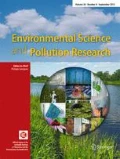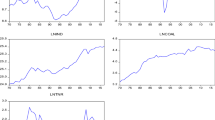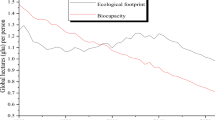Abstract
In the empirical literature, there is no agreement on the linkage between environmental deterioration and economic growth. Thus, this paper aims to explore the long-run and causal effects of CO2 emissions, globalization energy usage, trade openness and urbanization on economic growth in Japan by employing new econometric techniques. The paper uses a dataset spanning from 1970 to 2015 and employs recent econometric techniques. To the best of the investigator’s understanding, no prior studies have examined this linkage utilizing the wavelet coherence technique for Japan. The novelty of the wavelet is that it can capture the causality and long-run linkage between economic variables at different frequencies and periods. Thus, the study’s aim is to address the following questions: (i) Is there a long-run and causal linkage between economic growth, energy usage, urbanization, CO2 emissions, trade openness and globalization? (ii) What is the interaction between economic growth and the regressors at various frequencies and periods? The paper utilizes the ARDL, DOLS and FMOLS to catch the long-run effects, whereas the wavelet coherence technique is employed to capture the causal effects among the indicators. The outcomes of the ARDL show that urbanization, CO2 emissions, globalization and energy usage trigger economic growth, while no significant linkage is found between trade openness and economic growth. The wavelet coherence approach reveals (i) positive co-movements between economic growth and the regressors and (ii) a one-way causality from CO2 emissions and energy usage to economic growth.








Similar content being viewed by others
Data availability
Data is readily available at: https://data.worldbank.org/country/japan
References
Adebayo TS, Beton Kalmaz D (2020) Ongoing debate between foreign aid and economic growth in Nigeria: a wavelet analysis. Soc Sci Q 101(5):2032–2051
Adebayo TS (2020) Revisiting the EKC hypothesis in an emerging market: an application of ARDL-based bounds and wavelet coherence approaches. SN Appl Sci 2(12):1–15
Adebayo TS (2021) Testing the EKC hypothesis in Indonesia: empirical evidence from the ARDL-based bounds and wavelet coherence approaches. Appl Econ J 28(1):1–23
Adebayo T, Akinsola G, Odugbesan J, Olanrewaju V (2021) Determinants of Environmental Degradation in Thailand: Empirical Evidence from ARDL and Wavelet Coherence Approaches. Pollution 7(1):181–196. https://doi.org/10.22059/poll.2020.309083.885
Adedoyin FF, Nathaniel S, Adeleye N (2020a) An investigation into the anthropogenic nexus among consumption of energy, tourism, and economic growth: do economic policy uncertainties matter? Environ Sci Pollut Res:1–13
Adedoyin FF, Gumede MI, Bekun FV, Etokakpan MU, Balsalobre-lorente D (2020b) Modelling coal rent, economic growth and CO2 emissions: Does regulatory quality matter in BRICS economies? Sci Total Environ 710:136284
Ahmed K, Bhattacharya M, Shaikh Z, Ramzan M, Ozturk I (2017) Emission intensive growth and trade in the era of the Association of Southeast Asian Nations (ASEAN) integration: An empirical investigation from ASEAN-8. J Clean Prod 154:530–540
Ahmed S, Alam K, Rashid A, Gow J (2020) Militarisation, energy consumption, CO2 emissions and economic growth in Myanmar. Defence Peace Econ 31(6):615–641
Altinay G, Karagol E (2005) Electricity consumption and economic growth: evidence from Turkey. Energy Econ 27(6):849–856
Al-Mulali U, Sab CNBC (2012) The impact of energy consumption and CO2 emission on the economic growth and financial development in the Sub Saharan African countries. Energy 39(1):180–186
Alam KJ, Sumon KK (2020) Causal relationship between trade openness and economic growth: A panel data analysis of Asian countries. Int J Econ Financ Issues 10(1):118–126
Akadiri SS, Bekun FV, Taheri E, Akadiri AC (2019) Carbon emissions, energy consumption and economic growth: a causality evidence. Int J Energy Techn Policy 15(2-3):320–336
Akinsola GD, Adebayo TS (2020) Investigating the Causal Linkage Among Economic Growth, Energy Consumption and CO2 Emissions in Thailand: An Application of the Wavelet Coherence Approach. Int J Renew Energy Dev 10(1):17–26
Awosusi AA, Adebayo TS, Adeshola I (2020) Determinants of CO2 Emissions in Emerging Markets: An Empirical Evidence from MINT Economies. Int J Renew Energy Dev 9(3):411–422
Batool R, Sharif A, Islam T, Zaman K, Shoukry AM, Sharkawy MA, Gani S, Aamir A, Hishan SS (2019) Green is clean: the role of ICT in resource management. Environ Sci Pollut Res 26(24):25341–25358
Baranzini A, Weber S, Bareit M, Mathys NA (2013) The causal relationship between energy use and economic growthin Switzerland. Energy Econ 36:464–470
Bayer C, Hanck C (2013) Combining non-cointegration tests. J Time Ser Anal 34(1):83–95
Banerjee A, Dolado J, Mestre R (1998) Error-correction mechanism tests for cointegration in a single-equation framework. J Time Ser Anal 19(3):267–283
Balli E, Sigeze C, Manga M, Birdir S, Birdir K (2019) The relationship between tourism, CO2 emissions and economic growth: a case of Mediterranean countries. Asia Pacific J Tour Res 24(3):219–232
Bilgili F, Öztürk İ, Koçak E, Bulut Ü, Pamuk Y, Muğaloğlu E, Bağlıtaş HH (2016) The influence of biomass energy consumption on CO 2 emissions: a wavelet coherence approach. Environ Sci Pollut Res 23(19):19043–19061
Bilan Y, Streimikiene D, Vasylieva T, Lyulyov O, Pimonenko T, Pavlyk A (2019) Linking between renewable energy, CO2 emissions, and economic growth: Challenges for candidates and potential candidates for the EU membership. Sustainability 11(6):1528
Boswijk HP (1995) Efficient inference on cointegration parameters in structural error correction models. J Econ 69(1):133–158
Dickey DA, Fuller WA (1981) Likelihood ratio statistics for autoregressive time series with a unit root. Econometrica: journal of the Econometric Society 49:1057–1072
Engle RF, Granger CW (1987) Co-integration and error correction: representation, estimation, and testing. Econometrica: journal of the Econometric Society 55:251–276
Guei KM, le Roux P (2019) Trade openness and economic growth: Evidence from the Economic Community of Western African States region. J Econ Financ Sci 12(1):1–9
Grossman, G. M., & Krueger, A. B. (1991). Environmental impacts of a North American free trade agreement (No. w3914). National Bureau of economic research.
Goupillaud P, Grossmann A, Morlet J (1984) Cycle-octave and related transforms in seismic signal analysis. Geoexploration 23(1):85–102
Gozgor G, Lau CKM, Lu Z (2018) Energy consumption and economic growth: New evidence from the OECD countries. Energy 153:27–34
Ha, N. M., & Ngoc, B. H. (2020). Revisiting the relationship between energy consumption and economic growth nexus in Vietnam: new evidence by asymmetric ARDL cointegration. Applied Economics Letters, 1-7.
Hammudeh S, Sohag K, Husain S, Husain H, Said J (2020) Nonlinear relationship between economic growth and nuances of globalisation with income stratification: Roles of financial development and governance. Econ Syst 44(3):100761
Ijirshar VU (2019) Impact of Trade Openness on Economic Growth among ECOWAS Countries: 1975–2017. CBN J Appl Stat 10:75–96
Ifeakachukwu NP (2020) Globalisation, Economic Growth and Income Inequality in Nigeria. Ind J Human Dev 14(2):202–212
Ivanov SH, Webster C (2012) Tourism’s impact on growth: the role of globalisation. Ann Tour Res 41:231–236
Johansen S (1991) Estimation and hypothesis testing of cointegration vectors in Gaussian vector autoregressive models. Econometrica 59:1551–1580
Khan Z, Ali M, Jinyu L, Shahbaz M, Siqun Y (2020a) Consumption-based carbon emissions and trade nexus: Evidence from nine oil exporting countries. Energy Econ:104806
Khan Z, Shahbaz M, Ahmad M, Rabbi F, Siqun Y (2019a) Total retail goods consumption, industry structure, urban population growth and pollution intensity: an application of panel data analysis for China. Environ Sci Pollut Res 26(31):32224–32242
Khan, Z., Ali, S., Umar, M., Kirikkaleli, D., & Jiao, Z. (2020b). Consumption-based carbon emissions and international trade in G7 countries: The role of environmental innovation and renewable energy. Science of The Total Environment, 138945.
Khan MK, Teng JZ, Khan MI (2019b) Effect of energy consumption and economic growth on carbon dioxide emissions in Pakistan with dynamic ARDL simulations approach. Environ Sci Pollut Res 26(23):23480–23490
Kalmaz DB, Kirikkaleli D (2019) Modeling CO 2 emissions in an emerging market: empirical finding from ARDL-based bounds and wavelet coherence approaches. Environ Sci Pollut Res 26(5):5210–5220
Kirikkaleli D, Kalmaz DB (2020) Testing the moderating role of urbanization on the environmental Kuznets curve: empirical evidence from an emerging market. Environ Sci Pollut Res 27(30):38169–38180
Kirikkaleli D, Adebayo TS (2020) Do renewable energy consumption and financial development matter for environmental sustainability? New Global Evid Sustain Dev. https://doi.org/10.1002/sd.2159
Kirikkaleli D, Adebayo TS, Khan Z, Ali S (2020) Does globalization matter for ecological footprint in Turkey? Evidence from dual adjustment approach. Environ Sci Pollut Res:1–9
Koc, S., & Bulus, G. C. (2020). Testing validity of the EKC hypothesis in South Korea: role of renewable energy and trade openness. ENVIRONMENTAL SCIENCE AND POLLUTION RESEARCH.
Khoshnevis Yazdi S, Dariani AG (2019) CO2 emissions, urbanisation and economic growth: evidence from Asian countries. Economic Research-Ekonomska istraživanja 32(1):510–530
Kong Q, Peng D, Ni Y, Jiang X, Wang Z (2020) Trade openness and Economic Growth Quality of China: Empirical Analysis Using ARDL Model. Financ Res Lett 101488
Kuznets S (1955) Economic growth and income inequality. Am Econ Rev 45(1):1–28
Leal PH, Marques AC (2020) Rediscovering the EKC hypothesis for the 20 highest CO2 emitters among OECD countries by level of globalization. Int Econ 164:36–47
Le HP, Ozturk I (2020) The impacts of globalization, financial development, government expenditures, and institutional quality on CO 2 emissions in the presence of environmental Kuznets curve. Environ Sci Pollut Res:1–18
Liu TY, Su CW, Jiang XZ (2015) Is economic growth improving urbanisation? A cross-regional study of China. Urban Stud 52(10):1883–1898
Masih AM, Masih R (1996) Energy consumption, real income and temporal causality: results from a multi-country study based on cointegration and error-correction modelling techniques. Energy Econ 18(3):165–183
Malefane MR (2020) Trade openness and economic growth in Botswana: Evidence from cointegration and error-correction modelling. Cogent Econ Fin 8(1):1783878
Malefane MR, Odhiambo NM (2019) Trade openness and economic growth: empirical evidence from Lesotho. Glob Bus Rev 0972150919830812
Mehmood U, Tariq S (2020) Globalization and CO 2 emissions nexus: evidence from the EKC hypothesis in South Asian countries. Environ Sci Pollut Res 27(29):37044–37056
Naz S, Sultan R, Zaman K, Aldakhil AM, Nassani AA, Abro MMQ (2019) Moderating and mediating role of renewable energy consumption, FDI inflows, and economic growth on carbon dioxide emissions: evidence from robust least square estimator. Environ Sci Pollut Res 26(3):2806–2819
Pesaran MH, Shin Y, Smith RJ (2001) Bounds testing approaches to the analysis of level relationships. J Appl Econ 16(3):289–326
Odugbesan, J. A., & Adebayo, T. S. (2020a). Modeling CO2 emissions in South Africa: empirical evidence from ARDL based bounds and wavelet coherence techniques. Environmental Science and Pollution Research, 1-13.
Odugbesan JA, Adebayo TS (2020b) The symmetrical and asymmetrical effects of foreign direct investment and financial development on carbon emission: evidence from Nigeria. SN Applied Sciences 2(12):1–15
Odhiambo NM (2009) Energy consumption and economic growth nexus in Tanzania: An ARDL bounds testing approach. Energy Policy 37(2):617–622
Onjala J, K'Akumu OA (2016) Relational patterns of urbanisation and economic growth in sub-Saharan Africa. Dev South Afr 33(2):234–246
Olimpia, N., & Stela, D. (2017). Impact of Globalisation on Economic Growth in Romania: An Empirical Analysis of Its Economic, Social and Political Dimensions. Studia Universitatis "Vasile Goldis” Arad–Economics Series, 27(1), 29-40.
Ouyang Y, Li P (2018) On the nexus of financial development, economic growth, and energy consumption in China: New perspective from a GMM panel VAR approach. Energy Econ 71:238–252
Onyibor K, Akinsola GD, Adebayo TS (2020) The impact of major macroeconomic variables on foreign direct investment in Nigeria: evidence from a wavelet coherence technique. SN Bus Econ 1(1):1–24
Panayotou T (1997) Demystifying the environmental Kuznets curve: turning a black box into a policy tool. Environ Dev Econ 2:465–484
Phillips PC, Perron P (1988) Testing for a unit root in time series regression. Biometrika 75(2):335–346
Udemba, E. N., Güngör, H., Bekun, F. V., & Kirikkaleli, D. (2020). Economic performance of India amidst high CO2 emissions. Sustainable Production and Consumption.
Umar M, Ji X, Kirikkaleli D, Xu Q (2020) COP21 Roadmap: Do innovation, financial development, and transportation infrastructure matter for environmental sustainability in China? J Environ Manag 271:111026
Pata UK (2018) Renewable energy consumption, urbanization, financial development, income and CO2 emissions in Turkey: testing EKC hypothesis with structural breaks. J Clean Prod 187:770–779
Rana R, Sharma M (2019) International trade, foreign direct investment, economic growth and CO2 emissions: a study of India. Interdiscip Environ Rev 20(1):73–82
Rafindadi AA, Ozturk I (2016) Effects of financial development, economic growth and trade on electricity consumption: Evidence from post-Fukushima Japan. Renew Sust Energ Rev 54:1073–1084
Raghutla, C. (2020). The effect of trade openness on economic growth: Some empirical evidence from emerging market economies J Public Affairs, e2081.
Sarkodie SA, Strezov V (2018) Empirical study of the environmental Kuznets curve and environmental sustainability curve hypothesis for Australia, China, Ghana and USA. J Clean Prod 201:98–110
Saboori B, Rasoulinezhad E, Sung J (2017) The nexus of oil consumption, CO 2 emissions and economic growth in China, Japan and South Korea. Environ Sci Pollut Res 24(8):7436–7455
Shahbaz M, Zakaria M, Shahzad SJH, Mahalik MK (2018) The energy consumption and economic growth nexus in top ten energy-consuming countries: Fresh evidence from using the quantile-on-quantile approach. Energy Econ 71:282–301
Shittu WO, Yusuf HA, El Houssein AEM, Hassan S (2020) The impacts of foreign direct investment and globalisation on economic growth in West Africa: examining the role of political governance. J Econ Stud 47:1733–1755
Saidi K, Hammami S (2015) The impact of CO2 emissions and economic growth on energy consumption in 58 countries. Energy Rep 1:62–70
Tamang P (2013) Urbanisation and economic growth: Investigating causality. Econometrics 1(3):41–47
Torrence C, Compo GP (1998) A practical guide to wavelet analysis. Bull Am Meteorol Soc 79(1):61–78
World Bank (2020) World Development Indicators.http://data.worldbank.org/country. Accessed 12 January 2020.
Zivot E, Andrews DWK (2002) Further evidence on the great crash, the oil-price shock, and the unit-root hypothesis. J Bus Econ Stat 20(1):25–44
Author information
Authors and Affiliations
Contributions
The author solely writes the entire manuscript
Corresponding author
Ethics declarations
Ethical approval
This study follows all ethical practices during writing.
Consent to participate
The author declares consent to participate.
Consent to publish
The author consents to publish this article in Environmental Science and Pollution Research.
Competing interests
The author declares that there are no conflicts of interest.
Transparency
The author confirms that the manuscript is an honest, accurate and transparent account of the study reported; that no vital features of the study have been omitted; and that any discrepancies from the study as planned have been explained.
Additional information
Responsible editor: Ilhan Ozturk
Publisher’s note
Springer Nature remains neutral with regard to jurisdictional claims in published maps and institutional affiliations.
Rights and permissions
About this article
Cite this article
Adebayo, T.S. Do CO2 emissions, energy consumption and globalization promote economic growth? Empirical evidence from Japan. Environ Sci Pollut Res 28, 34714–34729 (2021). https://doi.org/10.1007/s11356-021-12495-8
Received:
Accepted:
Published:
Issue Date:
DOI: https://doi.org/10.1007/s11356-021-12495-8




